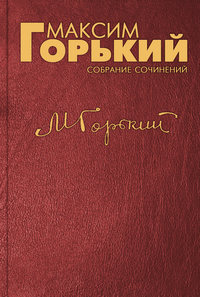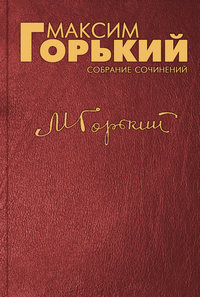 полная версия
полная версияThe Spy
Klimkov quickly glanced around at the man in the hat, who had already risen, and was walking to the door, his head lifted high and a frown on his brow. Yevsey stepped after him, but Melnikov jumped to the platform, and blocked the doorway with his large body.
"Hat off!" he bawled.
The man faced about abruptly, and walked to the other exit. There he was met by Zarubin, who shouted in a loud voice:
"Here, this man in a hat! I know him! He makes bombs! Take care, boys!"
A revolver gleamed in Zarubin's hand. He swung it as if it were a stone, and thrust it forward. People from the street clambered to the platform, and the passengers pressing to the exits met them face to face. The lady screeched:
"Take off your hat! Why, man!"
All screamed, roared, and pressed one another. Their eyes staring insanely, fastened upon the man in the hat.
"I'm going to shoot! Get away!" the man shouted aloud, advancing upon Zarubin. The spy retreated, but he was pushed in back, and fell to his knees. Supporting himself on the floor with one hand, he stretched out the other. A shot rang out, then another. The windows rattled. For a second all the cries congealed. Then the firm voice said contemptuously:
"Vile curs!"
The air and the windows quivered with a third shot, and Zarubin uttered a loud cry:
"Ugh!" His head struck the floor, as if he were making an obeisance at somebody's feet. The car became emptier and quieter. Klimkov ensconced in a corner, shrivelled up on his seat, and thought listlessly:
"I might have been killed."
The thought darted by, and disappeared without rousing in the darkness of his soul either fear or joy. He looked around wearily. The man in the hat stood on the platform of the car. Melnikov advanced toward him past Yevsey, and Zarubin lay motionless face downward.
"I will shoot you down – everyone of you! Get away from here!" the loud, dry cry was heard from the platform.
But Melnikov stepped across the body of Yakov, seized the fair-haired youth by the waist, and threw him into the street.
"Beat him down – !" he shouted bluntly in a savage voice.
Three revolver shots followed in quick succession. The deaf blows clapped. Someone howled in a long-drawn plaintive cry like an infant.
"Oh, oh, my leg!"
Another man shouted hoarsely with an effort:
"Ah, ah! Hit him on the head! Hey, hey!"
And a thin hysterical voice pealed in ecstasy:
"Tear him to pieces, my dear people. Choke him! Enough! Their time is past! Now we'll give it to them. Now our turn has come – "
All the cries were suddenly covered by a loud ejaculation full of mournful disdain:
"Idiots!"
Yevsey reeled from weakness in his legs. He walked to the platform, from which he saw a dark heap of people. With bent backs, swinging their arms and legs, groaning with the strain of excitement, uttering tired hoarse articulations, they stirred busily on the street, like large shaggy worms, as they dragged over the stones the body of the fair-haired youth, already crushed and torn. They kicked at it, tramped on its face and chest, pulled its hair, its legs and arms, and simultaneously tore him in different directions. Half bare, covered with blood, it flapped against the stones, soft as dough, with each blow losing more and more semblance of a human figure. These people worked over him industriously. The little lean muzhik trying to crush his skull, stepped on it with one foot, and sang out:
"Aha! Our time has come, too."
The work was accomplished. One after the other they left the middle of the street for the pavement. A pockmarked fellow wiped his hands on his short sheepskin overcoat, and asked with the air of a manager, or superintendent:
"Who took his pistol?"
Now the voices sounded weary, reluctant. But on the pavement a laugh was heard coming from a small group of people standing next to the lamp-post. An offended voice was discussing hotly:
"You lie! I was the first. The second he fell I gave him one on the jaw with my boot."
"Cabman Mikhailov pounced on him first, then I."
"Mikhailov got a bullet in his leg."
"If it didn't hit the bone, it's all right."
These people after tasting blood had apparently grown bolder. They looked around on all sides with unsatiated eyes, with greed, and assured expectation.
In the middle of the street lay a formless dark heap, from which blood was oozing into the hollows between the stones.
"That's the way – " Yevsey thought, looking at the red designs on the paving. In the dark red mist trembling before his eyes appeared the hairy face of Melnikov. His voice was tired and muffled.
"There, they've killed him!"
"Yes, how quickly!"
"They killed another one this morning."
"What for?"
"He was speaking. He was standing on the curb addressing the people. Chasin fired into his stomach."
"What for?" Yevsey repeated.
"Those speakers are deceivers – a spurious manifesto – there's no such thing – all a bluff!"
"Sasha thought that all out," said Yevsey quietly, with conviction.
Melnikov shook his head, and looked at his large hands.
"Somebody always deceives," he mumbled in a drunken voice.
He entered the car, and raised Zarubin lightly, placing him on the bench face up.
"He's dead. There's where it hit him – "
Yevsey sought the scar on Zarubin's face that the blow of the bottle had left. He did not find it. Now over the right eye was a little red hole from which Klimkov could not tear his eyes. It absorbed his entire attention, and aroused sharp pity for Yakov.
"Have you a pistol?" asked Melnikov.
"No."
"There, take Yakov's."
"I don't want to. I don't need it."
"Now everybody needs a pistol," said Melnikov simply, and slipped the revolver into Yevsey's overcoat pocket. "Yes, there was a Yakov, now there is no Yakov."
"It was I who marked him for death," thought Yevsey, looking at his comrade's face.
Zarubin's brows were sternly drawn. A look of serious preoccupation gleamed and died away in his dim eyes. His little black mustache bristled on his raised lip. He appeared to be annoyed. His half-open mouth seemed ready to pour forth a rapid torrent of irritated talk.
"Come," said Melnikov.
"And he – how about them?" asked Yevsey, tearing his eyes from Zarubin.
"The police will take them away. It's against the law to remove the killed. Let's go somewhere, and shake ourselves up. I haven't eaten to-day. I can't eat – the third day without food. No sleep either." He sighed painfully, and concluded with somber sang froid. "I should have been killed in Yakov's place."
"Sasha will ruin all," said Yevsey, through his teeth. "He'll ruin us all."
"Blindness of the soul."
They walked along the street without observing anything, and each spoke that with which his own mind was occupied. Both were like drunken men.
"Where's the truth?" asked Melnikov, putting his hand forward, as if to test the air.
"There, you see, two have been killed," said Yevsey, making an effort to catch an elusive thought.
"Many people have been killed to-day, I should think. All are blind."
"Why did Sasha arrange this?"
"I don't love him either."
"He's the one who ought to be killed," exclaimed Yevsey, with bitter vengefulness.
Melnikov was silent for a long time. Then he suddenly shook his fist in the air, and said resolutely:
"Enough! I've taken sins enough upon myself. On the other side of the Volga I have an uncle, a very old man. He is all I have in this world. I'll go to him. He keeps an apiary – when he was young he was tried for forgery." After another pause of silence the spy laughed quietly.
"What's the matter?" asked Yevsey, annoyed.
"I'm forgetting everything. My uncle has now been dead for three years."
They reached a café known to them. Yevsey stopped at the door, and looked meditatively at the illuminated windows.
"People again," he muttered, dissatisfied. "I don't want to go in there."
"Let's go in. It's all the same," said Melnikov, taking him by the arm, and leading him after himself. "It will be tiresome for me to be here alone. Besides I've become fearsome. I'm not afraid of being killed if I'm recognized as a spy. It's just a general feeling of dread."
The two men did not enter the room in which their comrades were wont to gather, but took seats in a corner of the common hall, where there were a number of persons, of whom none were drunk, though the talk was noisy and evinced unusual excitement. Klimkov by habit began to listen to the conversations, while the thought of Sasha clung to him, and quietly unfolded itself in his head, stupefied by the impressions of the last days, but freshened by the constant influx of poignant hatred and fear of the spy.
He recalled the sullen face of the dead Zarubin, the mauled body of the fair-haired man. He looked in perplexity at the noisy public, blinking as if half asleep. All was incoherent, as in a nightmare. Melnikov drank tea with no appetite, keeping silent and from time to time stretching himself.
Not far from them at a table sat three men, apparently clerks with the characteristic speech of the class. They were young and fashionably dressed, with a display of gay necktie. One of them, a curly-headed youth with a tanned face spoke excitedly, his dark eyes flashing.
"They utilize the ferocity of hungry ragged rowdies, by which they want to prove to us that liberty is impossible because of the many barbarians such as these. However – permit me – savages did not show themselves for the first time yesterday. There have always been such, and justice has always been able to cope with them; they could be held under fear of the law. Then why are they permitted to perpetrate every sort of outrage and bestiality to-day?" He looked around the hall with the air of a victor, and answered his question with hot conviction. "Because they want to point out to us, 'You are for freedom, ladies and gentlemen, well here you have it. Freedom for you means murder, robbery, and all kinds of mob violence.'"
"Do you hear?" demanded Yevsey, triumphantly. "Isn't that Sasha's scheme?" The hot voice of the orator roused in his soul the quiet smouldering hope. "Maybe Sasha won't conquer."
Melnikov looked at him sullenly, without replying.
The curly-headed man rose from the chair, and continued waving a glass of wine in his hand.
"It's not true, and I protest. Honest people want liberty, not in order to crush one another, but in order for each to be protected against the prevailing violence of our lawless life. Liberty is the goddess of reason. They have drunk enough of our blood. I protest. Long live liberty!"
The public raised a cheer, and sprang to their feet.
Melnikov looked at the curly-headed orator, and muttered:
"What a fool!"
"He speaks truly," rejoined Yevsey, angrily.
"How do you know?" asked the spy indifferently, and began to drink the beer in slow gulps.
Yevsey wanted to tell this heavy man that he himself was a fool, a blind beast, whom the cunning and cruel masters of his life had taught to hunt people down. But Melnikov raised his head, and looking into Klimkov's face with dark eyes terribly widened, said in a sounding whisper:
"I'm afraid for this reason: when I was in prison an incident happened there – "
"Hold on," said Yevsey, "I want to listen."
A thin voice which drilled the ear, pierced triumphantly through the soft mass of sounds.
"Did you hear? He says a goddess, yet we Russian people have only one goddess, the Holy Mother of God, the Virgin Mary. That's how those curly-headed youngsters speak!"
"Out with him!"
"Silence!"
"No, if you please. If there's liberty, everyone has a right – "
"You see? The curly-headed youngsters walk the streets, beat the people who rise up to maintain the Czar's truth against treachery, while we Russians, the True Orthodox, don't dare even to speak. Is this liberty?"
"They'll fight," said Klimkov, starting to tremble. "Somebody will be killed. I'm going."
"What a peculiar fellow you are! Well, let's go. The devil take them! What are they to you?"
Melnikov flung the money on the table, and moved toward the exit, his head bowed low, as if to conceal his conspicuous face. On the street in the dark and the cold, he began to speak in a subdued voice:
"When I was in prison – it was on account of a certain foreman, who was strangled in our factory – I was hauled up, too. They told me I would get hard labor. Everybody said it, first the coroner, then the gendarmes joined in. I got frightened. I was still young, and I didn't take to the idea of hard labor. I used to cry." He coughed a clapping cough, and slackened his pace. "Once the assistant overseer of the prison, Aleksey Maksimych, a good little old man, came in to me. He loved me. He grieved for me all the time. 'Ah,' says he, 'Liapin,' – my real name is Liapin – 'Ah,' says he, 'brother, I'm sorry for you. You are such an unfortunate fellow – '"
Melnikov's speech unfolded itself like a soft band upon which Klimkov quietly let himself down, as upon a narrow path leading down into the darkness, into something terrible and awesomely interesting.
"He comes and says he, 'Liapin, I want to save you for a good life. Yours is a hard-labor case, but you can escape it. The only thing you need to do is to execute a man. He was sentenced for political assassination. He will be hanged according to law in the presence of a priest, will be given a cross to kiss, so that you needn't be uneasy about it.' I say, 'Why not? If with the consent of the authorities, and if I'm to be pardoned, I'll hang him. Only I can't.' – . 'We'll teach you,' says he. 'We have a man who knows how, but he's stricken with paralysis, and can't do it himself.' Well for a whole evening they taught me. It was in a deep dungeon. We stuffed a sack with rags, tied it with a string, so as to make a neck. Then I pulled it up on a hook. I learned how to do the business. Early in the morning they gave me half a bottle to drink, led me out into the yard with soldiers carrying guns. I see a gallows has been erected, and various officers before it. They are all muffled up and shrivelled. It was autumn then, too, November. I ascended the scaffolding, and the boards shook, creaked under my feet like teeth. This made me feel uncomfortable, and I said 'Give me more whiskey. I'm afraid.' Then they brought him – "
Melnikov again began to cough dully, and clutched at his throat. Yevsey pressed up to him, trying to keep step with him. He kept his eyes fastened on the ground, not daring to look either to the front or the side.
"I see a young powerful fellow. He stands firm, and all the time keeps stroking his head from his forehead back to his neck. I began to put the face-cloth on him. I must have pulled or pinched him in some way, and he tells me quietly without anger, 'Be more careful, brother.' Yes. The priest gave him the cross, and he says, 'Don't disturb yourself. I'm not a believer.' His face was so – as if he knew everything that would be after death, and now and to-morrow and always, knew it for certain. Somehow I strangled him, shaking all over. My hands grew numb, my legs would not hold me. I felt horrible on account of him – he was so calm about it all – a master over death."
Melnikov was silent, looked around, and began to walk more quickly.
"Well?" asked Yevsey in a whisper.
"Well, I strangled him. That's all. Only ever since, when I see or hear that a man has been killed, I recollect him – always. In my opinion he was the only man who knew the truth. That was why he was not afraid. And the main thing is, he knew what would be to-morrow – which no one knows. I tell you what, Yevsey, come to me to sleep, eh? Come, please."
"All right," said Yevsey quietly.
He was glad of the offer. He could not walk to his room alone – along the streets in the darkness. He felt a tightness in his breast and a heavy pressure on his bones, as if he were creeping under ground, and the earth were squeezing his back, his chest, his sides, and his head: while in front of him gaped a deep pit, which he could not escape, into which he must soon descend – a silent bottomless abyss down which he would drop endlessly.
"That's good," said Melnikov. "I would feel bored alone."
"If you would kill Sasha – " Yevsey advised him sadly.
"There you are!" Melnikov fended off the idea. "What do you think – that I love to kill? They asked me twice again to hang people, a woman and a student. I declined. I might have had two to remember instead of one. The killed appear again. They come back."
"Often?"
"Sometimes, sometimes not. When often, it's every night. How can you defend yourself against them? I can't pray to God. I've forgotten my prayers. Have you?"
"I remember mine."
They entered a court, and were long in penetrating to its depths, stumbling as they walked over boards, stones, and rubbish. Then they descended a flight of steps, which Klimkov, feeling the walls with his hands, thought would never come to an end. When he found himself at last in the lodging of the spy, and had examined it in the light of the lamp, he was amazed to see the mass of gay pictures and paper flowers with which the walls were almost entirely covered. Melnikov at once became a stranger in this comfortable little room, with a broad bed in a corner behind white curtains.
"All this was contrived by the woman with whom I lived," said Melnikov, starting to undress. "She ran away, the hussy! A gendarme, a quartermaster, decoyed her. I can't understand it. He's a grey-haired widower, while she's young and greedy for a male. Nevertheless she went away. The third one that's left me already. Come, let's go to bed."
They lay side by side in the same bed, which rocked under Yevsey like a tossing sea, and all the time descended lower and lower. His heart sank with it. The spy's words laid themselves heavily upon his breast.
"One was Olga."
"What!"
"Olga. Why?"
"Nothing."
"A little one, thin and jolly. She used to hide my hat, or something else, and I would say, 'Olga, where's my hat?' And she would say, 'Look for it. You're a spy.' She liked to joke, but she was a loose woman. I hardly had my head turned, before she was with somebody else. I was afraid to beat her. She was frail. Still I pulled her hair. You've got to do something."
"Lord!" quietly exclaimed Klimkov. "What am I going to do?"
His comrade was silent for a while, then said dully and slowly:
"That's the way I howl, too, sometimes."
Klimkov buried his head in the pillow, compressing his lips tightly, to restrain the stubborn need to utter cries and complaints.
CHAPTER XXVIII
Yevsey awoke with a certain secret resolution, which held his bosom as with a broad invisible belt. It stifled him. The ends of this band, he felt, were held by some insistent being, who obstinately led him on to an inescapable something. He harkened to this desire and tested it carefully with an awkward, timorous thought. At the same time he did not want it to define itself.
Melnikov dressed and washed, but uncombed, was sitting at the table next to the samovar, munching his bread lazily like an ox.
"You sleep well," he said. "I drowsed a little, then awoke, while it was still night, and suddenly saw a body beside me. I remembered that Tania wasn't here, but I had forgotten about you. Then it seemed to me that that person was lying there. He came and lay down – wanted to warm himself." Melnikov laughed a stupid laugh, which, apparently, embarrassed him the next instant. "However, it's not a joke. I lighted a match and looked at you. It's my idea you're not well. Your face is blue like – " He broke off with a cough, but Yevsey guessed the unspoken word, and thought gloomily:
"Rayisa, too, said I would choke myself."
The thought frightened him, clearly alluding to something he did not want to remember. Then he tried insistently to evoke some desire which might help him to befool himself, to conceal the unavoidable, that which had already been determined.
"What time is it?" he asked.
"Eleven."
"Early still."
"Early," confirmed the host, and both were silent. Then Melnikov proposed:
"Let's live together, eh?"
"I don't know."
"What?"
"What will happen," said Yevsey, after reflecting a moment.
"Nothing will happen. You're a quiet fellow. You speak little, neither do I like to speak always. If it's tiresome I speak, or else I keep quiet all the time. When you ask about something, one says one thing, another says another thing, and a third still another. Well, the devil take you, think I. You have a whole lot of words, but none that are true."
"Yes," said Yevsey for the sake of answering.
"Something must be done," he thought in self-defense. Suddenly he resolved, "At first I will – Sasha – " But he did not wish to represent to himself what would be afterward. "Where are we going to go?" he inquired of Melnikov.
"To the office," Melnikov replied with unconcern.
"I don't want to," declared Yevsey drily and firmly.
Melnikov combed his beard for a time in silence. Then he shoved the dishes from him, and placing his elbows on the table, said meditatively in a subdued voice:
"Our service has become hard. All have begun to rebel, but who are the real rebels here? Make it out, if you can."
"I know who's the first scoundrel and skunk," muttered Klimkov.
"Sasha you mean?" inquired Melnikov.
Yevsey gave no reply. He was quietly beginning to devise a plan of action. Melnikov started to dress, sniffing loudly.
"So we're going to live together?"
"Yes."
"Are you going to bring your things to-day?"
"I don't know."
"Will you sleep here tonight?"
After some reflection Yevsey said:
"Yes."
When the spy had gone, Klimkov jumped to his feet, and looked around frightened, quivering under the stinging blows of suspicion.
"He locked me in, and went to tell Sasha. They'll come soon to seize me. I must escape through the window."
He rushed to the door. It was not locked. He calmed himself, and said with heat, as if convincing somebody:
"Well, is it possible to live this way? You don't believe anybody – there is nobody – "
He sat long behind the table without moving, straining his mind, employing all his cunning to lay a snare for the enemy without endangering himself. Finally he hit upon a plan. He must in some way lure Sasha from the office to the street, and walk with him. When they would meet a large crowd of people, he would shout:
"This is a spy, beat him!" And probably the same thing would happen as had happened to Zarubin and the fair-haired young man. If the people would not turn upon Sasha as seriously as they had yesterday upon the disguised revolutionist, Yevsey would set them an example. He would fire first, as Zarubin had. But he would hit Sasha. He would aim at his stomach.
Klimkov felt himself strong and brave, and made haste to leave. He wanted to do the thing at once. But the recollection of Zarubin hindered him, knotting up the poverty-stricken simplicity of his contrivance. He involuntarily repeated his notion. "It was I who marked him for death."
He did not reproach, he did not blame, himself. Yet he felt that a certain thread bound him to the little black spy, and he must do something to break the thread.
"I didn't say good-by to him – and where will I find him now?"
On putting on his overcoat, he was gladdened to feel the revolver in his pocket. Responding to a fresh influx of power and resolution, he walked out into the street with a firm tread.
But the nearer he got to the Department of Safety the more did his bold mood melt and fade away. The feeling of power became dissipated, and when he saw the narrow dull alley at the end of which was the dusky, three-storied building, he suddenly felt an invincible desire to find Zarubin, and take leave of him.
"I insulted him," he explained his desire to himself, embarrassed and quickly turning aside from his aim. "I must find him."
At the same time he vaguely felt he could not escape from that which seized his heart and pressed him, drew him on after itself, and silently indicated the one issue from the terrible entanglement.
The problem of the day, the resolve to destroy Sasha, did not hinder the growth of the dark and evil power which filled his heart, while the sudden wish to find the body of the little spy instantly became an insurmountable obstacle to the carrying out of his plan.









